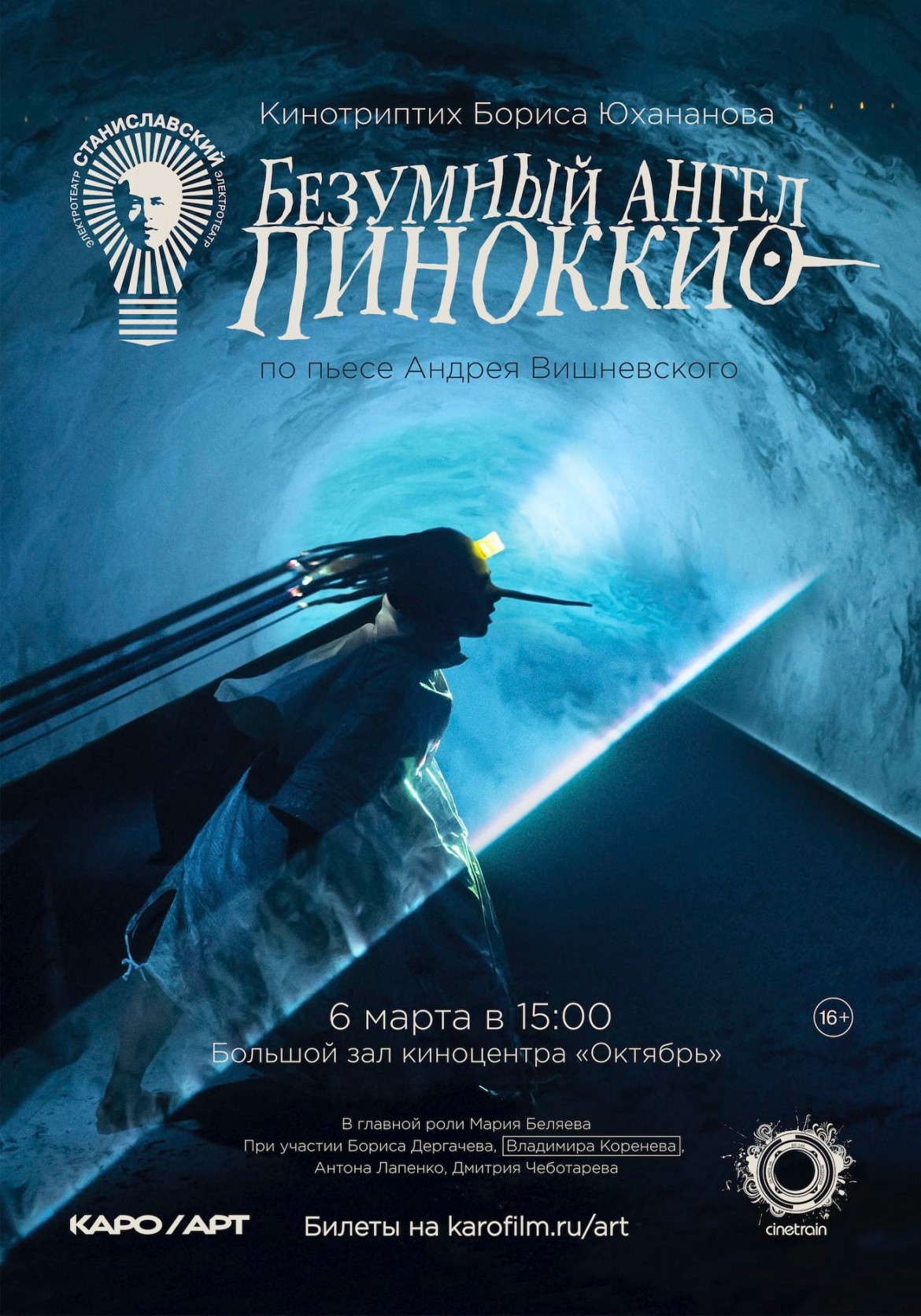
The world premiere of Boris Yukhananov's film triptych is based on Andrei Vishnevsky's play The Mad Angel Pinocchio, as performed under the title of Pinocchio at the Stanislavsky Electrotheatre. It was a winner of multiple Golden Mask National Awards in 2021.
The film premiere will take place March 6 in the main hall of the Oktyabr cinema center. The screening will be followed by a discussion with Boris Yukhananov.
The film will run with two intermissions beginning at 3 p.m.
On March 18, the film will be released exclusively throughout the network of KARO cities: Moscow, St. Petersburg, Kaliningrad, Samara, Novosibirsk, Yekaterinburg, Tyumen and Surgut.
“The path of Pinocchio is the path of an angelic soul entering the middle world, that is, a world in which a human is displaced by what is inhuman,” said Boris Yukhananov. “The pure soul of a wooden man takes on the perniciousness of this reality, and theatre is the magnifying glass which turns the embers of this filth into a conflagration. However, the mad angel Pinocchio passes through this flame and, as must happen in fairy tales, a consciousness is formed that no one can do anything about. Pinocchio is a story of indestructible purity that withstands the onslaught of manipulative reality.
“In the language of the film, we sought to combine the requisite beauty that theatre provides with the spectacularity that should be present in a fairy tale, and, without which, I would say, the miracle of identification will not and cannot take place in cinema. That remains true even if this film is made in a mode of concentration that our current world allows us today. Everything was filmed on set.
“We sought a manner of filming, editing, and organization of light and music, wherein we would not miss the charm of a big story - and a fairy tale is always that, deeply immersed by plot in exaggerated theatricality, in theatre as a reflective image of the world.”
“The premiere and further distribution of Boris Yukkhananov’s film triptych of Pinocchio in the KARO cinema chain as part of the KARO.Art project is a unique event for moviegoers and fans of theatrical art. This is our first step in cooperation with the Stanislavsky Electrotheatre. I am sure that future collaborative plans will delight and surprise the audience,” said Maya Manerova, Vice President for Film Screening Management at KARO.
The film stars Maria Belyaeva as Pinocchio. It also features the legendary Russian actor Vladimir Korenev (1940-2021) in his last roles, the Old Man and the King. Also featured are young theatre and film stars Anton Lapenko, Boris Dergachyov, Dmitry Chebotaryov and Anton Filipenko.
PINOCCHIO. FOREST. PART ONE. BIRTH OR FATHER
The surgeon Geppetto and his assistant Cherry receive the birth of a boy in the Magic Forest. This Little Man born of a Tree is brought to maturity in a flask in Geppetto's laboratory, but then escapes. Surviving numerous dangerous adventures, Pinocchio returns home, and falls asleep by the oven where he is burned to a crisp.
Geppetto rebuilds Pinocchio. He makes him new legs and takes him into the Magical Forest, where Pinocchio is dressed in a thin robe of forest matter. Gepetto goes to the city to exchange his cloak for a grammar book that he will give to Pinocchio.
PINOCCHIO. THEATRE. PART TWO. ROSE AND RAFFLESIA OR THEATRE
Entranced by music he hears, Pinocchio sells his grammar book and, instead of going to school, buys a ticket to the Theatre.
A string of magical episodes passes before Pinocchio's eyes before a Rose woven of Light appears to him. Pinocchio, having ascended from the hall to the stage, enters the radiance of the Rose and disrupts an ongoing performance.
For disrupting the performance, the director of the Mangiafuoco Theatre sentences Pinocchio to be burned, but chooses instead to punish Pinocchio, a theatrical neophyte, by “hooking” him on Theatre as if it were a drug, so that all life beyond the stage seems to Pinocchio a living hell. With the aim of making Pinocchio a “Theatre addict,” Mangiafuoco arranges for the young man a tour of all the halls and levels of the building.
Pinocchio learns that the Theatre is an entirely uncommon phenomenon, located simultaneously in different layers of time: in our time, and at that moment in the history of Genesis when mankind lost Paradise. Pinocchio encounters a swarm of angelic creatures that have lost their Eden. Creatures fall in streams from a giant rose. The Theatre building (a "Needle") is located inside this Stream, while the "Needle" is pointed at the core of the Rose.
Mangiafuoco shows Pinocchio how he lures angels to his theatre with the help of Rafflesia – predatory flowers that absorb any living creature, fascinated by their smell and beauty.
Pinocchio discovers that Vaclav Nijinsky, the finest of all theatre creatures, exists inside Mangiafuoco, and represents what Mangiafuoco himself once was. Pinocchio helps Nijinsky's "inner being" leave Mangiafuoco’s shell temporarily. But Mangiafuoco brings Nijinsky back, and throws Pinocchio out of the theatre. Whirlwinds carry Pinocchio to the center of the Rose.
“This new theatrical mini-series contains everything we love about the Stanislavsky Electrotheatre – visual sensations involving the elements of fire, water, air, and earth, theatrical storms, inhuman passions, theatrical magic and alchemy, archaism and a technical prowess that is unthinkable in Moscow. If the ancient mystagogues had possessed such opportunities to influence the secret worlds as does the Electrotheatre, we, ‘a tribe of creatures awarded with noses, but devoid of reason,’ would now live in another world.”
– Lyudmila Bredikhina. “Why did the Stanislavsky Electrotheatre premiere two Pinocchios at once?” Vedomosti newspaper





